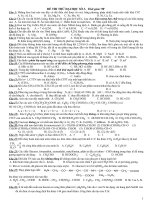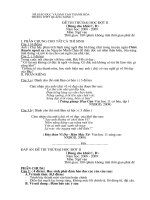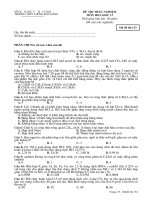DE THI THU TNQG 2
Bạn đang xem bản rút gọn của tài liệu. Xem và tải ngay bản đầy đủ của tài liệu tại đây (68.36 KB, 4 trang )
SỞ GD & ĐT AN GIANG
TRƯỜNG THPT BA CHÚC
ĐỀ THI THỬ TỐT NGHIỆP QUỐC GIA
Môn: TIẾNG ANH
Thời gian làm bài: 60 phút, không kể thời gian phát đề
(Đề thi có 50 câu / 4 trang)
222
Họ và tên thí sinh: ______________________.
Số báo danh: __________________________.
Mark the letter A, B, C, or
part differs from the other
Question 1: A. packed
Question 2: A. feat
D on your answer sheet to indicate the word
three in pronunciation in each of the following
B. added
C. hoped
D.
B. great
C. seat
D.
whose underlined
questions.
pronounced
beat
Mark the letter A, B, C, or D on your answer sheet to indicate the word that differs from the
other three in the position of primary stress in each of the following questions.
Question 3: A. risky
B. conserve
C. liquid
D. forest
Question 4: A. competitor
B. participant
C. volunteer
D. minority
Mark the letter A, B, C, or D on your answer sheet to indicate the underlined part that needs
correction in each of the following questions.
Question 5: Although this car appears to be manufactured by a different company, it has the same
A
B
C
body style, size, and perform as that one.
D
Question 6: The popularity of soccer in the United States were increased significantly by the playing of the
A
B
C
World Cup in cities throughout the country in 1994.
D
Question 7: Could you take care in my handbag while I am going to the toilet?
A
B
C
D
Mark the letter A, B, C, or D on your answer sheet to indicate the correct answer to each of
the following questions.
Question 8: In the past, women used to be __________dependent on their husbands or fathers.
A. economic
B. economical
C. economically
D. economy
Question 9: Be sure to __________ a real effort to answer all the questions the interviewer asks.
A. do
B. make
C. put
D. take
Question 10: Probability of extinction depends _______ both the population size and fine details of the
population demography.
A. on
B. in
C. from
D. for
Question 11: Although I encountered many difficulties in my studying, I tried my best to ________them.
A. get over
B. turn off
C. go ahead
D. get up
Question 12: I put my cousin in _________ with a friend who works at the company
A. connection
B. link
C. respect
D. contact
Question 13: The more you study, ______.
A. the more knowledge do you gain
B. you are the more knowledgeable
C. the more knowledge you gain
D. you will gain more knowledge
Question 14: By the end of this month, I ________English for 6 years.
A. have learnt
B. will have learnt
C. had learnt
D. learnt
Question 15: All the iron doors________ by wooden doors.
A. must be replaced
B. must replaced
C. must replaced
D. must to be replaced
Question 16: Nowadays elephants are one of the __________ species in the world. They need protecting.
A. enlightened
B. expensive
C. endangered
D. enlarged
Question 17: _______ in Rome than he was kidnapped.
A. No sooner he arrived
B. Had he no sooner arrived
C. No sooner had he arrived
D. No sooner he had arrived
Question 18: He asked me _________ home the day before.
A. what time I leave
B. what time I will leave
C. what time I left
D. what time I had left
Question 19: I can't find my book anywhere; I _________ it at home.
A. must have been leaving
B. must leave
C. must be leave
D. must have left
Mark the letter A, B, C, or D on your answer sheet to indicate the most suitable response to
complete each of the following exchanges.
Question 20: Tina and Lewis are very happy because they are going to have three holidays in a row. They are
discussing what they are going to do during the holidays.
- Tina: We're going to go hiking and camping in the mountains.
- Lewis: “_______________ Mountain is my favourite destination.”
A. I prefer going hiking to camping.
B. I don’t like mountains.
C. That sounds exciting!
D. How wonderful you are.
Question 21: Jennifer and Katherine are discussing advantages and disadvantages of supermarkets and
traditional markets.
- Jennifer: “I believe that supermarkets are much better than traditional markets.”
– Katherine: “____________ Each has its own features.”
A. I couldn’t agree with you more.
B. That’s completely true.
C. I disagree with you.
D. I can’t help thinking the same
Mark the letter A, B, C, or D on your answer sheet to indicate the word(s) CLOSEST in meaning to
the underlined word(s) in each of the following questions.
Question 22: The saturated, dripping dog ran in the house after swimming in the lake.
A. wet
B. old
C. dirty
D. smelly
Question 23: Precipitation, such as rain and snow, falls from the sky.
A. lightening
B. water that falls from the sky
C. thunder
D. wind that causes disasters
Mark the letter A, B, C, or D on your answer sheet to indicate the word(s) OPPOSITE in meaning to
the underlined word(s) in each of the following questions.
Question 24: Although the princess is familiar to those in London, she is unknown to the rest of the world.
A. infamous
B. famous
C. unknown
D. well-known
Question 25: Although Mary was willing to play in the snow, Jack was reluctant because he was so cold.
A. ill-prepared
B. willing
C. unwilling
D. excited
Mark the letter A, B, C, or D on your answer sheet to indicate the sentence that is closest in
meaning to each of the following questions.
Question 26: People say he won a lot of money on the lottery.
A. He is said that he won a lot of money on the lottery.
B. He won a lot of money on the lottery, it is said.
C. He is said to have won a lot of money on the lottery.
D. He was said to win a lot of money on the lottery.
Question 27: "Don't forget to give the book back to Mary," he said to me.
A. He reminded me to give the book back to Mary.
B. He reminded me to forget to give the book back to Mary.
C. He advised me to give the book back to Mary.
D. He advised me to forget to give the book back to Mary.
Question 28: My wife didn’t leave the car keys, so I couldn’t pick her up at the station.
A. If my wife had leave the car keys, I could pick her up at the station.
B. If my wife had left the car keys, I could pick her up at the station.
C. If my wife had left the car keys, I could have picked her up at the station.
D. If my wife had left the car keys, I could picked her up at the station.
Mark the letter A, B, C, or D on your answer sheet to indicate the sentence that best combines
each pair of sentences in the following questions.
Question 29: Mr. Smith is a professor. His car was stolen yesterday.
A. Mr. Smith, who is a professor, his car was stolen yesterday.
B. Mr. Smith, who his car was stolen yesterday, is a professor.
C. Mr. Smith, whose car was stolen yesterday, is a professor.
D. His car was stolen yesterday, he is a professor.
Question 30: The weather was very hot. They continued playing football.
A. Although the hot weather, they continued playing football.
B. In spite of the hot weather, they continued playing football.
C. In spite of the weather was hot, they continued playing football.
D. Despite the weather was hot, they continued playing football.
Read the following pasage and mark the letter A, B, C or D on your answer sheet to indicate the
correct word or phrase that best fits each of the numbered blanks from 31 to 35.
READING
Reading is one of the simplest forms of relaxation for mind and body. Relaxation reading helps us take
our minds off our problems if even only for a short time, (31)_______ helps to reduce stress levels. The
pressures of work and life these days mean that more people are getting stressed and (32)_______ it difficult to
relax. A good story can aid you in relaxing the mind.
Reading can also be fun. Lately, fewer people are reading books and more people are watching
television and playing video games. Many people have forgotten how much fun it is to read a book. A book can
open a world of excitement and adventure for the reader. Reading helps improve your knowledge and
(33)_______ your understanding of the world.
Choosing a book that suits you is as (34)_________ as choosing a DVD! There are many different kinds
of books, and authors have different styles of writing. Most people have a favorite actor or kind of film. It is just
as easy to have a favorite book or author. There are books for everyone: Fiction, Romance, Thriller, Action
Adventure, or Horror. Why don’t you start reading a new book today? You might be lucky (35)_______ to find a
book that changes your life!
Question 31:
A. what
B. which
C. that
D. who
Question 32:
A. find
B. see
C. feel
D. discover
Question 33:
A. rises
B. reduces
C. increases
D. gets up
Question 34:
A. ease
B. easy
C. easily
D. uneasy
Question 35:
A. too
B. such
C. so
D. enough
Read the following pasage and mark the letter A, B, C or D on your answer sheet ti indicate the
correct answer to each of the questions
In some cultures, tea drinking is a social event with specific customs. China and the United Kingdom are
two countries with formal, well-developed tea cultures.
In China, there are ceremonial customs for every aspect of tea drinking, from filling the cup to thanking
the pourer. A tea drinker can thank the server by tapping the table with the index and middle fingers. In
Chinese society, tea customs can express a range of emotions. Offering tea to one’s elders, for example, is a
way of showing respect. In other situations, pouring tea for someone can be a form of apology. On the other
hand, a newly married couple may serve tea during their wedding ceremony to express gratitude to their
parents for all the sacrifices they made raising them.
In the United Kingdom, tea culture is closely tied to the workday schedule. Afternoon tea, Britain’s
best-known tea ceremony, started in the 1840s. It usually happens between 4 and 6 p.m. but can be somewhat
earlier or later. It is a time for conversation and relaxation, when people take a break from their day.
Traditionally, afternoon tea was taken with a light snack of pastries and sandwiches. The tea itself, usually from
India or Ceylon (which is now known as Sri Lanka), was served in a silver teapot and china cups. Afternoon tea
is still sometimes served formally today, but it is just as often served informally. High tea is a variation on
afternoon tea originally adapted for working-class families who could not afford a proper dinner. It happens
slightly later in the day and is served with food more substantial than pastries and sandwiches.
In China, tea customs are a means of emotional expression. In the United Kingdom, they break up the
workday schedule and give people an opportunity to socialize and rest. But these traditions are disappearing in
both countries as time goes by. What purpose do tea customs in your country serve? Are these customs still
followed today?
Question 36: What is the passage mainly about?
A. how Chinese tea customs inflenced the United Kingdom
B. the similarities between Chinese and British tea ceremonies
C. reasons why tea is such an important beverage around the world
D. how tea is consumed in two particular societies
Question 37: The word “them” in paragraph two refers to _____.
A. situations
B. parents
C. sacrifices
D. newly married couple
Question 38: The main purpose of the fourth paragraph is to _______.
A. show that tea customs have a very long history
B. explain that the meaning of tea drinking varies by culture
C. point out that China and the United Kingdom have much in common
D. explain why tea customs in China and the United Kingdom are disappearing
Question 39: The word “tied” in paragraph 3 is closest in meaning to
A. recorded
B. collected
C. reported
D. related
Question 40: Why do couples serve tea during their wedding ceremony in China?
A. to thank their parents for raising them
B. to show thanks to each other
C. to offer respect to the wedding guests
D. to express their love to the public
Question 41: Which is NOT true about the United Kingdom’s tea culture?
A. It is inflUenced by the workday schedule.
B. Tea times happen in the afternoon or evening.
C. Only wealthy people observe the tradition.
D. Food is generally served.
Question 42: What can be inferred about afternoon tea?
A. It was started to make people work longer. B. It used to happen earlier in the day than it does now.
C. It is rarely served in an informal setting.
D. It is not consumed with a heavy meal.
Read the following passage and mark the letter A, B, C, or D on your answer sheet to indicate the
correct answer to each of the questions
Look in the mirror—are you wearing glasses right now? Did you choose that particular pair of glasses
because of their function or because of their design? Nowadays, we have many options to
choose from.
Glasses have come a long way since the time of their origin. The first record of lenses used for
magnification appears in an Egyptian text from around the 5th century B.C. Yet the first mention of
eyeglasses did not come until more than a millennium and a half later. In 1306, a religious leader in Italy
mentioned that eyeglasses had been around for two decades. From that, we can infer that they were invented
around 1286. In the 18th century, Benjamin Franklin developed the technology further when he created
bifocals.
In spite of advances like contact lenses and laser eye surgery, glasses remain popular today. What will
be the next major leap in the evolution of glasses? Technology companies are researching ways to make glasses
into wearable computers. Perhaps these will one day replace smartphones. Future glasses may have a function
that is completely apart from correcting vision. They may look like the glasses of the past, with a headband that
runs across your forehead and hooks behind each ear. But instead of having lenses, they may hold a partially
transparent screen in front of your eyes. Using this screen, you may be able to make calls, browse the Internet,
and get directions. In addition to a screen, future glasses may have an earpiece, speaker, and microphone,
which may allow you to control the device through speech. If you actually need glasses to correct your vision,
however, you may have to hope that these futuristic features can be built into regular glasses.
The glasses of the future sound very convenient, but it’s likely they will have some unforeseen side
effects. It would be a good idea to study their impact before we start wearing screens in front of our eyes all the
time.
Question 43: What is the passage mainly about?
A. how glasses were invented in ancient Egypt
B. why glasses have not changed much since their invention
C. the benefis of making wearable computers in the future
D. how glasses have evolved and what they might be like in the future
Question 44: The word “they” in paragraph 2 refers to _______.
A. decades
B. options
C. glasses
D. leaders
Question 45: The main purpose of the fourth paragraph is to _________.
A. explain what glasses will probably look like in the future
B. warn readers about a possible problem with future glasses
C. make readers excited about possible developments in eyewear
D. explain the differences between glasses of the past and the present
Question 46: The word “partially” in paragraph 3 is closest in meaning to
A. not quickly
B. not correctly
C. not regularly
D. not completely
Question 47: Where did the fist record of lenses appear?
A. in an 18th century book about eye surgery
B. in notes made by the inventor Benjamin Franklin
C. in an Egyptian text from the 5th century B.C.
D. in a talk given by an Italian leader
Question 48: Which is NOT mentioned as a feature of future glasses?
A. They will fil the function of a smartphone.
B. They will have a partially see-through screen.
C. They will be controlled through speech.
D. They will be more comfortable than regular glasses.
Question 49: The word “unforeseen” in paragraph 4 is closest in meaning to _______
A. unpredicted
B. unbelievable
C. unknown
D. unestimated
Question 50: What can be inferred about future glasses?
A. They will not contain lenses that correct vision. B. They will cost less than current glasses.
C. They will be less breakable than normal glasses. D. They will not need to be worn every day.









